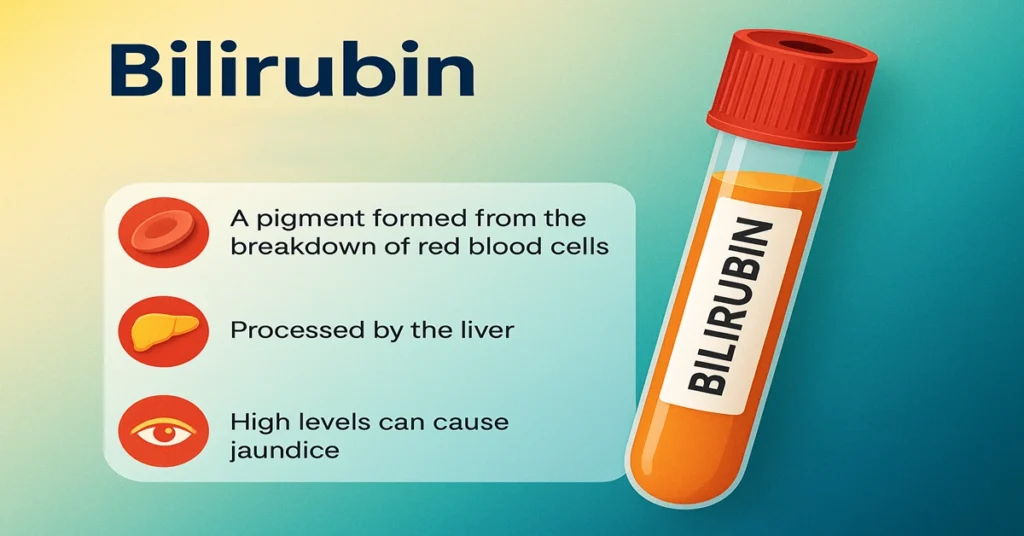What is Bilirubin Total?
Bilirubin is a yellow-orange pigment produced when red blood cells (RBCs) break down naturally after completing their lifespan. The Total Bilirubin Test measures the combined levels of:
- Unconjugated (Indirect) Bilirubin – not yet processed by the liver
- Conjugated (Direct) Bilirubin – processed by the liver and excreted in bile
This test is mainly used to check liver health, bile flow, and red blood cell breakdown.
Where is Bilirubin Produced in the Body?
- Unconjugated bilirubin forms in the spleen and bone marrow during the breakdown of old RBCs.
- It then travels to the liver, where it gets converted into conjugated bilirubin.
- Conjugated bilirubin is finally removed from the body through bile, and passes out in stool and urine.
Main Functions and Importance
Bilirubin itself does not serve a functional role in the body — it is a waste product. But it is very important as a diagnostic marker for:
- Liver diseases (hepatitis, cirrhosis)
- Bile duct blockage
- Hemolytic anemia (fast RBC destruction)
- Newborn jaundice
Causes of Low Bilirubin Levels
Low bilirubin is generally not a health concern. Possible minor causes include:
- Overhydration
- Certain antioxidant therapies
- Laboratory error or sample dilution
Symptoms of Low Bilirubin
- Usually no specific symptoms
- Rarely related to underlying health conditions
Causes of High Bilirubin (Hyperbilirubinemia)
- Liver disease (hepatitis, cirrhosis, liver failure)
- Gallstones or bile duct obstruction
- Excess RBC breakdown (hemolysis)
- Gilbert’s syndrome (mild liver condition)
- Newborn jaundice (immature liver function)
- Drug-induced liver injury
Symptoms of High Bilirubin
- Yellow skin and eyes (jaundice)
- Dark urine
- Pale stools
- Itching (pruritus)
- Fatigue, abdominal pain (in liver disease)
Reference Ranges
| Component | Normal Range |
|---|---|
| Total Bilirubin | 0.3 – 1.2 mg/dL |
| Direct (Conjugated) | 0.1 – 0.4 mg/dL |
| Indirect (Unconjugated) | 0.2 – 0.8 mg/dL |
Sample Type
- Sample Type: Serum
- Tube Used: Red Top (Plain Tube)
Test Preparation
- Fasting for 4–6 hours may be required (follow doctor’s advice).
- Avoid alcohol before the test as it affects liver function.
- Inform your doctor about any medicines (like antibiotics, birth control pills, or anti-seizure drugs) as they may alter results.
When to Consult a Doctor
See your doctor if you have:
- Yellowing of skin/eyes (jaundice)
- Dark urine or pale stools
- Long-term fatigue, loss of appetite, or unexplained weight loss
- Severe itching or abdominal discomfort
Important Word Explanations
- Hemolysis: Rapid breakdown of red blood cells.
- Gilbert’s Syndrome: A mild, inherited liver condition that raises bilirubin levels.
- Conjugated Bilirubin: Processed by the liver and water-soluble.
- Unconjugated Bilirubin: Not yet processed, fat-soluble form.
~END~

